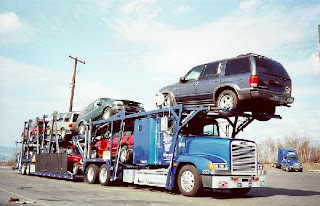Did I Speak Too Soon About Labor Peace?
 Just over two weeks ago, I wrote an article about how there had finally been some good news about labor peace; the American Axle strike had ended, the CAW had agreed to a new collective bargaining agreement with GM and Chrysler, and a key GM plant’s UAW workers had agreed to a local agreement, ending a strike that idled the full size crossover plant in Lansing Delta Township, Michigan that builds the Acadia, Outlook, and Enclave.
Just over two weeks ago, I wrote an article about how there had finally been some good news about labor peace; the American Axle strike had ended, the CAW had agreed to a new collective bargaining agreement with GM and Chrysler, and a key GM plant’s UAW workers had agreed to a local agreement, ending a strike that idled the full size crossover plant in Lansing Delta Township, Michigan that builds the Acadia, Outlook, and Enclave.
Perhaps I spoke too soon, however. While the three events I wrote about on May 14 were indeed good news and significant positive labor developments, there are so many contentuous relationships between labor and management in all aspects of an auto industry in recession that just as one agreement is signed, another pair seems to go to war. And I’m not just talking about OEM auto manufacturers such as GM and Chrysler; this is happening throughout the supplier base and now even after the vehicles are built.
I specifically mentioned labor problems “after the vehicles are built” because the second-largest auto transport company, Performance Transportation Services, Inc., is expected to see its Teamsters-represented workforce go on strike beginning Monday, June 9 to protest PTS’ bankruptcy court-approved 15% wage reductions for union employees. The company is currently in Chapter 11 bankruptcy protection for the second time since 2006, and is blaming its problems on the lethal combination of sky-high diesel fuel prices and declining production (and therefore shipments) of new vehicles from its customers to dealers. PTS clients include Toyota, GM, and Ford, although spokespeople for all three companies indicated that contingency plans are in place. Still, it can’t be welcome news for companies like GM and Ford, who are struggling against several headwinds in the marketplace (plus GM just resuming production at many of its plants after the two-month American Axle strike).
The second problem is an even thornier issue. The CAW, fresh into its new collective bargaining agreement with GM that its membership ratified about two weeks ago, is absolutely livid about GM’s recent announcement that it would be closing the Oshawa, Ontario pickup plant soon. According to the CAW, GM bargained with them in bad faith, since it pledged to keep the Oshawa truck plant open “dependent on market conditions,” then decided two weeks after bargaining that market conditions had deteriorated to the point that production was no longer viable in one of their highest-cost (but highest-quality) truck plants. The CAW spent several days last week blockading the GM Canada headquarters in Oshawa to protest the action, and CAW president Buzz Hargrove has said that the union would decide sometime next week what steps to take next, including the possibility of a strike to protest GM’s action.
For its part, GM met with CAW leadership in Detroit last week for a 90-minute meeting and outlined more details for the union about what went into their decision to close the plant (specifically, that GM now views high gas prices as a permanent reality, so GM also considers the related consumer shift away from large vehicles. The company had no comment on the possibility of a strike, since the union has not officially called for one.
Depending on where the strike occurs (whether it’s local to Oshawa, or covers the entire population of GM employees in Canada represented by the CAW), a strike obviously couldn’t come at a worse time for the company. The company is shedding market share at an alarming rate, bleeding cash monthly, chipping in billions of dollars to bail out troubled suppliers (Delphi, American Axle, plus the rumored purchase of battery supplier Cobasys). If GM doesn’t make it, the cause isn’t likely to be one single issue, but rather the proverbial “death by a thousand cuts.” GM paying their troubled suppliers for buyouts is like asking a still-bleeding stab wound victim to donate a pint of blood.
I’d love nothing more than to see a thriving, successful GM driven by outstanding products (the company is making great progress on that front) that are relevant to the current market conditions (not so great on this one), and propelled by excellent marketing (the huge divisional structure means too many mouths to feed with marketing dollars, so products get support at launch then are left on the vine to fend for themselves for the next five years of their life cycle). But these issues keep coming up; it’s like the company takes one step forward then two backward. Even if these two labor disagreements are settled in a way favorable to the manufacturers, what dispute is looming around the corner ready to hit them next? And will it be the next dispute – or one two years from now – be the one that finally causes GM to wave the white flag of surrender?




